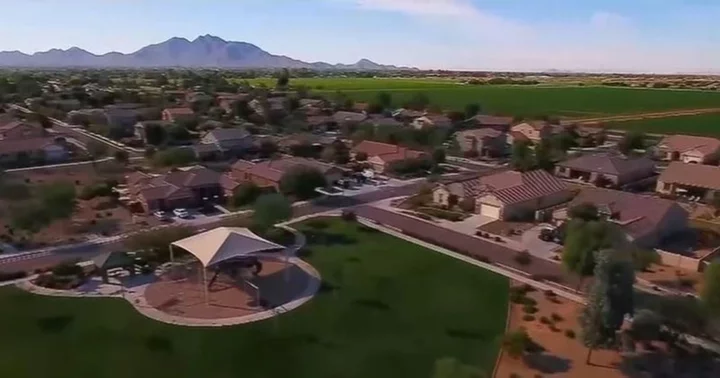PHOENIX, ARIZONA: In the vast expanse of Arizona's McMullen Valley, where vibrant green alfalfa fields stretch beneath the desert sun, a brewing tension simmers among local farmers.
For over sixty years, families like Matthew Hancock's have relied on groundwater to cultivate crops in this arid land, weathering the unpredictability of nature.
However, the arrival of foreign agribusiness firms like Al Dahra has sparked fears about the sustainability of water resources and the future of agriculture in the region.
Al Dahra farming sparks concerns over aquifer depletion
According to AZ Family, Wenden, a town of around 700 people nestled within this valley, has become a focal point for concerns over water scarcity.
Complaints abound about dried-up backyard wells since Al Dahra commenced alfalfa farming on thousands of acres.
The exact amount of water consumed by these foreign operations remains unclear, yet estimations suggest an enormous requirement, potentially straining the area's aquifers.
Matthew Hancock, among others, worries about potential state intervention redirecting the groundwater to urban areas amid severe drought conditions.
The situation reflects a broader global concern as corporations from water-stressed nations eye distant locations, like Arizona, to secure resources for agricultural production.
As COP28, the United Nations climate summit, convenes in Dubai, discussions about groundwater depletion and its impact on vulnerable regions like the Middle East take center stage.
Robert Glennon, a water policy expert, said “Water shortages have driven companies to go where the water is."
Arizona's rural zones attract agribusiness amid calls for control
Arizona's unregulated rural areas have become a prime target for international corporations seeking fertile land and abundant water.
Concerns about over-pumping, dried wells, and environmental repercussions have spurred calls for stricter regulations.
La Paz County Supervisor Holly Irwin emphasizes the urgent need for oversight, decrying the exploitation of local resources for overseas exports.
“You’re starting to see the effects of lack of regulation," she said. "Number one, we don’t know how much water we have in these aquifers, and we don’t know how much is being pumped out.”
"Irwin laments that foreign firms are "mining our natural resource to grow crops such as alfalfa ... and they’re shipping it overseas back to their country where they’ve depleted their water source.”
Gary Saiter, representing a local water improvement district, highlights the drastic drop in water levels over the years, exacerbated by water-intensive crops like alfalfa.
“I believe that the legislature in the state needs to step up and actually put some control, start measuring the water that the farms use," Saiter said.
Calls for legislative action to monitor and control water usage on farms gain traction among concerned stakeholders.
Despite claims of sustainability by these foreign firms, questions persist regarding the long-term impact of their extensive farming operations on Arizona's aquifers.
The absence of comprehensive regulations has left rural Arizona vulnerable to exploitation, triggering concerns about the depletion of crucial water resources.
International battle for water resources
The dilemma extends beyond Arizona, reflecting a global struggle between agricultural demands and water conservation.
Karim Elgendy, a sustainability specialist, anticipates more countries seeking new locations for food production as climate change exacerbates droughts.
Amid these disputes, Arizona finds itself at a crossroads, balancing agricultural interests with water conservation imperatives.
The urgency to protect and regulate groundwater resources grows more pressing as foreign entities capitalize on the uncontrolled access to the state's precious water supply.
The outcome of these debates will significantly shape Arizona's agricultural landscape and reverberate across the globe.
As discussions unfold at COP28, the issue of water scarcity and responsible agricultural practices takes on heightened significance.
It's a critical moment for Arizona and nations worldwide to address the growing threat posed by the exploitation of limited water resources for global agricultural needs.

